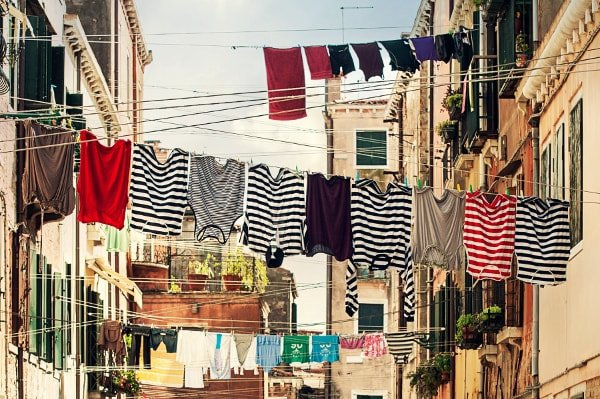The idea that we need to acquire organisation materials, more boxes and wardrobes, create additional space in the loft, garage or shed stems from the general idea of our modern world that “more is better” and that we have to keep consuming to keep the world from standing still. I find that we need to take a moment occasionally to figure out what it is we actually need and what we are being told we need. There is a difference, and sadly that distinction is lost on many of us. I include myself in that respect and very occasionally find myself trapped in the same kind of thoughts. Luckily, awareness of this issue can be increased and become part of who we are. The more we have, the more we need to take care of. The more we limit our need to acquire and keep stuff, the fewer things we have to worry about. Less stuff means less need for storage. And that, in turn, leads to less clutter all around. Wouldn’t this be wonderful? In practice, however, many of us have not reached that point yet. This is not surprising if we look around for a moment: consumerism has become the religion of the masses, to no small degree as a result of concerted efforts by production companies, advertising agencies and peer pressure. It comes as no surprise that those companies who produce things want us to buy more, and more often, and because of that the quality of products in general has been declining over the past decades, unless you are prepared to spend a pretty penny for something that is a little more long-lasting. And even then, the higher price often is only related to the fact that there is a brand logo on the things we buy, making them more valuable for no apparent reason. Advertising plays a huge role as well: paid by the producers, advertising agencies have been slaving over ways to sell things more efficiently. Remember the good old days when advertisements came up only in print or on tv occasionally? Today, whenever you surf the web, look at your email, read an online newspaper or look at your smartphone, there will be lots of ads to wade through. And not only these ads are everywhere, they are also targeted based on your behaviour in the past. No wonder we all click those banners and popups and end up seeing things we eventually might want to buy. Now consider peer pressure: keeping up with the Joneses is no thing of the past, it’s very much alive and kicking. Maybe we don’t compete over the latest model of car or our beautiful water feature in the front garden, but we sure do compete. Where did you spend your last holiday? What exciting things have you done last weekend? Where did you have dinner last night and what did you eat? Of course we are competitive, and social media help us propagate that competitive nature. This is the reason why people would post pictures of their food on facebook or why the sales of GoPro cameras have gone through the roof: it’s all about being able to conserve that moment and show it off to whoever is near enough to be exposed to it! While dealing in memories and experiences is a good thing in terms of storage and lack thereof, it most certainly does nothing to limit the emotional and practical interference it creates to everyone that person is trying to show off to. Coming back to the subject of ‘better organisation’ of the things we have, there are obvious solutions out there, of course: more shelf space can be created higher up, high ceilings could be converted into storage areas, more or deeper cupboard could be placed. All those are good solutions if we are just looking at managing the excess that we already have, but besides making sure we limit the intake, there are good reasons to think about cutting down the sheer amount of things we keep rather than finding space to put them in. Why is that? Any space you can find or create will – by definition – be a space that has previously not been used, and usually those are difficult to access or simply not very practical in nature. The question to ask yourself here is simple: if I shove things into a space that I am having trouble accessing, will I actually use these things and how much trouble am I willing to go to in order to get these things out of there again? Add to that another one: How long will it take for me to forget where these things are? Those are valid questions to ask: if you don’t remember you have something or if you couldn’t be bothered finding and using them … why keep them at all? Maybe it’s time to let go of them and spend time doing things that are important to you rather than chasing and managing things that do not mean that much to you. If you have enjoyed reading this, you may find these other articles interesting: Comments are closed.
|
Ask the ClutterMeisterIdeas to help clear away the mess in your homes and in your minds.
Feel free to share any of my posts, but please put in a backlink to the original blog post. Thank you. The author
Hi, my name is Tilo Flache. My mission: help clients declutter mind and space.
This blog contains pointers for your journey towards a happier living experience. Archives
November 2023
|




 RSS Feed
RSS Feed




